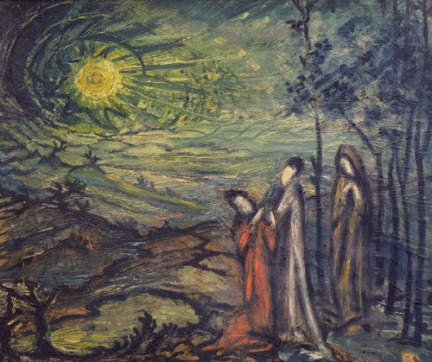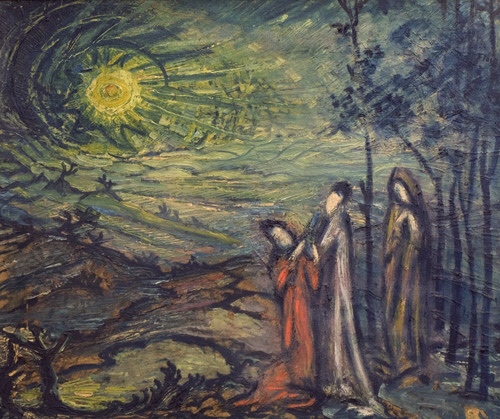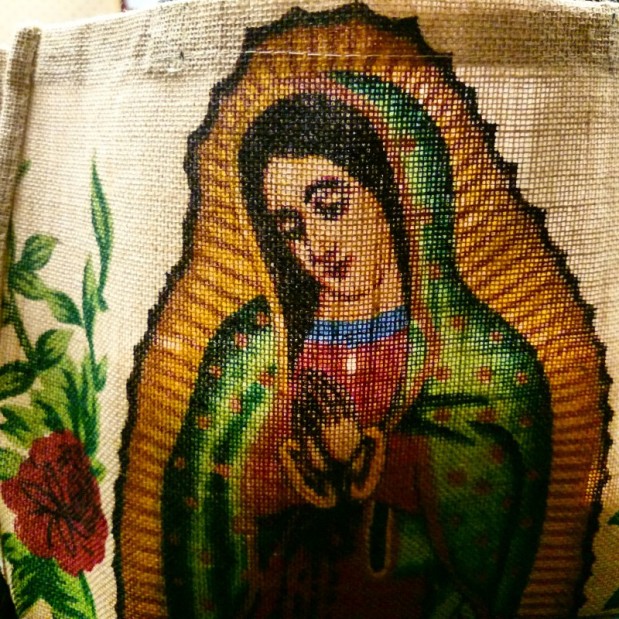It’s taken me a long time to answer last week’s RCIA questions, and perhaps you’ll see why:
What has Jesus done to save me?
What is God doing to save me?
Those questions are at the same time deeply personal, and somewhat generic. Anyone with even a passing knowledge of Christianity knows the “generic” answer to at least the first question, and many Christians can probably quote some pertinent Bible verses.
It’s only recently that salvation has become personal for me. “You have made us for yourself, O Lord, and our hearts are restless until they rest in you.” (Saint Augustine) Although blessed with so much, I felt empty until I returned to God. And that’s what Jesus has done to save me. His saving act upon the cross allows us to return to God, it bridges that separation, it enables that close, fulfilling relationship with God.
Throughout those years when I’d left Christianity and “dabbled” in Buddhism, it was as if I were subconsciously trying to work out my own salvation. I knew I was a sinner, feeling exactly as Paul did when he said (in his letter to the Romans):
I do not understand what I do. For what I want to do I do not do, but what I hate I do. And if I do what I do not want to do, I agree that the law is good. As it is, it is no longer I myself who do it, but it is sin living in me. For I know that good itself does not dwell in me, that is, in my sinful nature. For I have the desire to do what is good, but I cannot carry it out. For I do not do the good I want to do, but the evil I do not want to do — this I keep on doing. Now if I do what I do not want to do, it is no longer I who do it, but it is sin living in me that does it. (Romans 7: 15-20)
I could have said all of that, I was that frustrated with myself! The thing is, Buddhism does not believe in sin or evil, so any wrong thoughts or actions that one does, are supposed to be worked out on the meditation cushion. Calm your mind, and you will eventually no longer react angrily. Be mindful, live in the moment, and eventually you will no longer think impatient thoughts. Meditate on impermanence and you will no longer lust after people or things (because they’re impermanent, after all!) Meditate on your own death, and you will no longer fear death…
Now, I’m not saying this doesn’t work for some people (and I definitely met many calm, peaceful, happy Buddhists!) but I knew it wasn’t working for me. I was the same, sinful me after a decade of daily meditation as I was going in! The only thing different, was my despair at my feelings of emptiness and what I termed “spinning my wheels”. If I could have put it into words, I’d have said, “What I want to do I do not do, but what I hate I do.”
And I also felt a desperate, almost despairing, need to believe in God! And although I felt the separation from God in my life, I also felt the potential for closeness, often while I was meditating — that thrill when the quiet in a room anticipates a sound, rather than dead silence. After awhile I could no longer deny that Presence. I could no longer deny my need for God. I need God to fill that emptiness and longing in my life. I need God to thank with overflowing gratitude for my blessings! I especially need God so that I can quit the endless, useless spinning of my wheels.
In my inner being I delight in God’s law; but I see another law at work in me, waging war against the law of my mind and making me a prisoner of the law of sin at work within me. What a wretched man I am! Who will rescue me from this body that is subject to death? Thanks be to God who delivers me through Jesus Christ our Lord! (Romans 7: 22-25)
We hear as children, “God is Love”, but I needed to experience that first-hand before I could believe it. For the first time I feel and believe I am loved and forgiven by God. I’m not sure what changed, except making small decisions to believe. To believe I could pray to Mary and she would hear my pleas for change in my life. To believe that the Presence I detect, and have been conscious of at moments throughout my life, is God’s Presence. To believe that the voice in my heart that is nudging me in certain directions is God’s Voice. To believe that my prayers and thoughts and gratitude and love for God are received. And to believe that this movement out of despair and lostness and toward God’s love and acceptance will continue.

And it is through Christ’s atoning sacrifice that I can be accepted back! “Just as sin ruled over all people and brought them to death, now God’s wonderful kindness rules instead, giving us right standing with God and resulting in eternal life through Jesus Christ our Lord.” (Romans 5: 21) I am so happy that I finally get it! 🙂
And emphasis on God’s wonderful kindness! It’s: “For God so loved the world that he gave his one and only Son…” Not “for God was so annoyed at the world”, or “for God so despaired of the world”, or “for God was so angry at the world”. Those reactions would have been justified, but I never experienced that from God when I returned to him. I only felt love and happiness! God freely gives of himself! It was Christ’s free gift that saves us! “My Father loves Me, because I lay down My life that I may take it up again. No one takes it from Me, but I lay it down of Myself. I have power to lay it down, and I have power to take it up again.” (John 10: 17-18)
And I recognize that this is an ongoing process. I lay down my sinful self before Christ in the Eucharist, and he atones for my and others’ sins. I constantly try to die to my sinful self, and instead live for Christ in me. I hope to continue to serve him the rest of my days. “I would rather be a doorkeeper in the house of my God, than to dwell in the tents of wickedness!”
 Star of Bethlehem by Waldemar Flaig (source)
Star of Bethlehem by Waldemar Flaig (source) 









